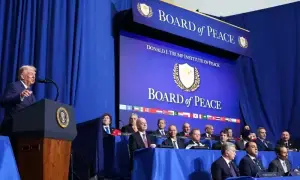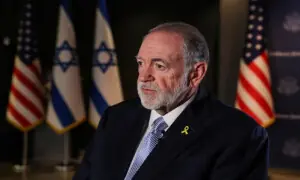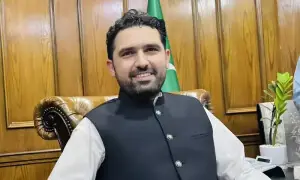Country on tenterhooks as Supreme Court's verdict on NA ruling, dissolution awaited
11 min readThe Supreme Court on Thursday resumed hearing the suo moto case related to the ruling of National Assembly Deputy Speaker Qasim Suri dismissing the no-confidence motion against Prime Minister Imran Khan on April 3, followed by the dissolution of the National Assembly by President Arif Alvi on the premier's advice.
A five-member larger Supreme Court bench headed by Chief Justice of Pakistan Justice Umar Ata Bandial and comprising Justice Munib Akhtar, Justice Jamal Khan Mandokhail, Justice Ijazul Ahsan and Justice Mazhar Alam Khan Miankhel is hearing the case.
At the onset of Thursday's hearing, Justice Miankhel inquired whether the proceedings of the Parliament would have protection, if the National Assembly violated the Constitution. Whether the apex court was not protector of the Constitution, he asked.
In his arguments Barrister Ali Zafar, representing President Dr Arif Alvi in the case, referred to a verdict related to the Muhmmad Khan Junejo government which was toppled. He said the court declared the toppling of Junejo's government unconstitutional, but it did not talk about the proceedings that surfaced after the government was dismissed.
At this Justice Miankhel remarked that currently the court had the issue of the no-confidence motion against Prime Minister Imran Khan followed by a ruling of the deputy speaker. He asked Barrister Zafar to address the issue.
In the current scenario, the National Assembly had been dissolved and fresh elections announced, the president's lawyer said.
CJP Bandial inquired where was the Constitutional crisis in the country, if everything was being done in accordance to the Constitution.
Barrister Zafar responded there was no crisis of the said nature.
CJP Bandial remarked NA deputy speaker’s ruling apparently violated Article 95 of the Constitution – related to the no-confidence motion against prime minister. The court had to consider the national interest as billions of rupees were spent on conducting the election.
Advocate Imtiaz Siddiqi – representing Prime Minister Imran Khan in the case – argued the proceedings of the Parliament were out of the ambit of the judiciary and asked the court to direct the Parliament to “clean the mess on its own”.
In his remarks on elections in 90 days, CJP Bandial said the whole system would be paralysed during the interim period which was not in the “national interest”.
Advocate Naeem Bukhari, amicus curiae, argued that it was possible that a resolution was rejected after it had been tabled as this was a usual practice in the court as well.
As the deputy speaker had opened the floor, former law minister Chaudhry Fawad Hussain asked for a point of order, which was unable to get once the voting on the no-confidence motion started.
Shehbaz in court
Former Opposition Leader in the National Assembly Shehbaz Sharif, while presenting his arguments in the court, said he would speak as a common man and not address the legal aspects of the case.
He said that after the ruling of the deputy speaker was annulled, the National Assembly – which had been dissolved - would automatically be restored.
Shehbaz added members of the Parliament should be allowed to vote on the no-confidence motion as this was the House’s job and the MNAs should decide the matter.
The PTI government was based on 174 votes currently, while the MNAs supporting the no-trust move against the premier stood at 177, he added. The real problem was the violation of the Constitution, Shehbaz underscored.
We will repair the constitution, Justice Mandokhel remarked.
When Justice Ahsan inquired about the duration of the National Assembly if the no-confidence motion was successful, Shehbaz said the duration of the Parliament would be one and a half years.
Punjab stand-off
Azam Nazeer Tarrar, representing former Leader of the Opposition in the National Assembly Shehbaz Sharif, and Punjab advocate general apprised the top court the events related to the nomination of the chief minister in which a session of the assembly was postponed till April 16. In a symbolic gesture opposition candidate Hamza Shehbaz was elected as the chief minister of the province with at least 200 MNAs voting for him, they told the court.
They also apprised that Hamza would take oath of the office at Bagh-e-Jinnah today. Former Punjab governor Chaudhry Sarwar is expected to be there as well.
At this CJP Bandial remarked that the top court would not issue any order related to the Punjab Assembly as it wanted to concentrate on the National Assembly case and directed that the provincial issue would be taken to the Lahore High Court.
In Wednesday's hearing, Senator Tarrar apprised the court of the confusion during the Punjab Assembly session and subsequent strained conditions in Lahore. The Punjab Assembly deputy speaker called the session today in the evening but the officials were not listening to his orders, he said, adding it seemed that the election for chief minister will not be held today.
CJP Bandial remarked that it was being alleged that the top court was not concluding the case, but the court intended to wrap it up. How could the Supreme Court deliver a biased verdict on this important case, the CJP inquired.
Vote of no-confidence
While presenting his arguments, Barrister Ali Zafar, representing President Dr Arif Alvi in the case, raised objection on the maintainability of the petition under Article 184 (3) of the Constitution. He quoted Article 69 of the Constitution and said the top court could not interfere in the proceedings of the National Assembly as the stated article imposed a boundary between the Supreme Court and the Parliament.
The court cannot interfere in the proceedings of the Parliament as it would be equal to giving directions to the speaker which would be unconstitutional, Barrister Zafar said. Approaching the court on the ruling of the speaker was equivalent to the interference in the proceedings of the Parliament and a court’s direction to the speaker would not come under the ambit of the judiciary, he argued, adding the National Assembly speaker was a respondent in the case.
Barrister Zafar added that the Parliament would not discuss a case which was sub-judice. Likewise, the court could not interfere in the proceedings of the Parliament, he said.
At this CJP Bandial inquired whether the top court could not intervene, if the speaker was violating the Constitution in the Parliament.
Barrister Zafar said he would continue his arguments on constitutional and unconstitutional proceedings later.
When Advocate Babar Awan, representing Pakistan Tehreek-e-Insaf in the case, started his arguments, CJP Bandial instructed the PTI lawyer to limit his arguments to the deputy speaker’s ruling and explain the legal aspects of it. The chief justice added the ruling was based on allegations and asked whether the National Assembly speaker had powers to deviate from the agenda.
Before announcing the verdict, the court said it wanted to know about the “foreign conspiracy” which was cited as the basis for the deputy speaker’s ruling, CJP Bandial remarked. "Where are the minutes of the NSC meeting?" he asked Awan.
Meanwhile, Justice Jamal Khan Mandokhel inquired whether the president can ask the prime minister about the reasons behind the dissolution of assemblies?
Barrister Zafar informed the court that the president is bound to act on the recommendation and it's not necessary to specify a reason in the summary behind dissolution.
Session adjourned
The court observed that it wants the lawyers to complete their arguments today so that the proceedings aren't prolonged, as it was the top court's ruling that was delaying the formation of the interim government setup following the dissolution of the National Assembly.
When CJP turned towards NA Speaker's counsel Naeem Bukhari to hear his arguments, he requested the court to allow him to give his arguments tomorrow (Thursday) as he was fasting.
The attorney general of Pakistan also requested the court to allow him to give his arguments tomorrow as they would be based on "lawful notes".
Upon this, the bench adjourned the hearing until 9:30 am Thursday.
Tuesday's hearing
During Tuesday's hearing, CJP Bandial remarked the formation of the caretaker government is not taking place due to the proceedings of the apex court regarding the matter.
Supreme Court seeks NA record on no-trust vote, hearing adjourned till tomorrow
The chief justice made it clear that they would only examine the legality and constitutionality of the deputy speaker's ruling on the no-confidence motion. The CJP said it is not the practice of the court to indulge in the matters pertaining to policies, whether related to the state or to foreign affairs.
CJP Bandial's remarks came when Advocate Makhdoom Ali Khan, representing Pakistan Muslim League-Nawaz in the case, asked the top court to summon intelligence chiefs and to hold an in-camera briefing on the “threat letter.”
Advocate Khan argued that the National Assembly speaker after the no-confidence resolution moved against him could not rule on the no-confidence resolution against the premier. The counsel said on April 3 it was shown on all the TV channels that the deputy speaker read out the prepared ruling and at the end of it read out the speaker’s name.
He argued under Article 95 of the Constitution when two procedural stages were passed then the logical step was to vote on the no-confidence resolution. He said the conduct of the prime minister becomes irrelevant once the procedure under Article 95 starts, adding the prime minister may be the purest human being or a nobleman but voting has to conclude. He said Rule (37) can only be implemented for the requirement of Article 95 of the Constitution.
Senator Raza Rabbani who appeared on behalf of the Pakistan Peoples’ Party said the Court may summon the original text of the "threatening" cable and also the minutes of the meeting of the National Security Committee. In order to have a finding under Article 5 Constitution of 1973, independent proceedings have to be initiated which may include the formation of a Judicial Commission to examine the veracity of such proceedings.
Advocate Ashfan Ghazanfar, who has also filed the petition, urged the bench to summon Asad Majeed, former Pakistani ambassador to the USA, to probe the letter.
In his arguments, Rabbani said the voting on a no-confidence motion could only be barred if the prime minister tendered their resignation. Otherwise once the no-trust motion was tabled in the National Assembly, voting was necessary.
Rabbani said the premier's move to dissolve the assemblies was a civilian coup, adding that the system by itself had selected an alternative for itself and which was 'unconstitutional'.
The Senator said that the no-confidence motion against the prime minister was tabled on March 28 but the NA session was adjourned.
Quoting Prime Minister Imran Khan, Rabbani said the premier in an interview said the establishment had given him three options. However, the establishment refuted the prime minister’s claim.
Early election the best option among three 'establishment' gave me, says PM Imran
CJP Bandial took a suo motu notice of the political crisis that emerged on Sunday after a session of the National Assembly - with the speaker refusing to take up the no-confidence motion citing Article 5 - was prorogued followed by the dissolution of the NA by President Arif Alvi on the advice of the premier.
The chief justice of Pakistan said that all orders and actions initiated by the prime minister and president regarding the dissolution of the National Assembly will be subject to the court's order.
Background
Earlier on Sunday Deputy Speaker Qasim Khan Suri prorogued the NA session after rejecting the united opposition's no-confidence motion against Prime Minister Imran Khan, terming it against Article 5 of the Constitution.
Consisting of two clauses, Article 5 of the Constitution talks about “Loyalty to State and obedience to Constitution and law”.
- “Loyalty to the State is the basic duty of every citizen.”
- “Obedience to the Constitution and law is the [inviolable] obligation of every citizen wherever he may be and of every person for the time being within Pakistan.”
In a written order, the apex court issued notice to Attorney General for Pakistan Khalid Javed Khan on the constitutionality of the decision of the deputy speaker to dismiss the motion of no confidence on the basis of Article 5 of the Constitution. The order was issued by the three-judge bench headed by CJP Bandial comprising Justice Ijazul Ahsan and Justice Muhammad Ali Mazhar.
The chief justice observed that public order must be maintained and no state functionary shall take any extra-constitutional step in the prevailing political situation.
The chief justice accepted a request by the Pakistan People’s Party to review the ruling of NA Deputy Speaker National Assembly Qasim Suri and issued notices to the political parties, namely the Pakistan Tehreek-e-Insaf, Pakistan Muslim League-Nawaz, PPP, Jamiat Ulema-e-Islam-Fazl, Balochistan National Party-Mengal and Awami National Party, who will be heard in Monday's hearing through their counsels.
CJP Bandial directed all the political parties in the country to act responsibly and said the law and order situation should not deteriorate. “The public order should be maintained,” he added.
"No state functionaries or bodies shall take any extra-constitutional measure and shall act strictly in accordance with Constitution and the law," read the court order.
The apex court also issued notices to the Interior secretary and the Defence secretary to report the steps being taken to ensure public order, peace and tranquillity throughout the country. The assistance of the Supreme Court Bar Association and the Pakistan Bar Council was sought in these suo moto proceedings.
Meanwhile, the election of a new leader of the House was scheduled in a Punjab Assembly session on Sunday. However, clashes during the provincial assembly session marred the proceedings and it was adjourned till April 6.
The top court issued notice to the Punjab advocate general to examine the decision by the deputy speaker of the Punjab Assembly and the situation that has arisen as a consequence thereof. In the written order, the top court stated that the proceedings have been adjourned "without citing any reason or cause."
Ahead of the hearing on Monday, the PPP through its counsel Farooq H Naik filed a petition in the court and requested to form a full-court bench for hearing the case as it is a complicated Constitutional issue that would be illustrated by all judges of the court. However, CJP Bandial dismissed the plea.
For the latest news, follow us on Twitter @Aaj_Urdu. We are also on Facebook, Instagram and YouTube.





















Comments are closed on this story.